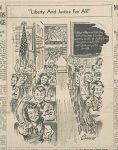
Pete Larsen, obituary indexing volunteer for the Morrison County Historical Society, called my attention to an interesting item in the October 5, 1942, edition of the Little Falls Daily Transcript.
The headline reads: “Five Children at Brickyards Spurn Pledge.” The article opened with the following: “Five children of the Frank Carlson family refused this morning to pledge allegiance to the flag in the Brickyards school, Dist. 24. Supt. George Sprandel, who visited the school at opening exercises, said the Carlson children stood with the rest of the pupils, but remained silent. One or two of the younger ones kept their hands in their pockets.”
Only a week earlier, Sprandel had decreed “that the pledge must be recited every day by every pupil in the Morrison county rural system, and he reiterated today that the order most [sic] be strictly enforced.”
School district representatives, including teachers Winnifred Olsson and Anna Folsom, and Superintendent Sprandel, visited the Calrson family at home to find out why the children were not saying the pledge. After questioning each child individually, Sprandel determined that each was “acting on their own volition.” The children’s mother cited religious reasons for them not saying the pledge and their father said he supported the children in their actions.
The punishment for not reciting the Pledge of Allegiance was being expelled from school, something that had already happened to Darlene Ahlbom, age 11, for the same infraction. A day after the article on the Carlson children appeared in the newspaper, they were expelled. (LFDT, Oct. 7, 1942)
To add insult to injury, Superintendent Sprandel sent a truancy notice to Frank Carlson by October 8, 1942, because they were no longer in school and Frank was required to provide them with an education. (LFDT, Oct. 8, 1942)
~ Mary Warner
Executive Director
This article originally appeared in the Morrison County Historical Society newsletter, Vol. 30, No. 3, 2017.
The Pledge of Allegiance Story Continues
In the last issue of the Morrison County Historical Society newsletter, we shared an article about five children from the Frank Carlson family who were expelled from the Brickyards School west of Little Falls for failing to say the Pledge of Allegiance. An article on Facebook about a current incident concerning a student being expelled in Texas for not saying the Pledge caught my attention.
According to a Washington Post article on the incident, Houston student India Landry wanted to show solidarity with Colin Kaepernick, former quarterback for the San Francisco 49ers, “who knelt during the national anthem in 2016 to protest police violence against black people, among other discrimination.” (The Washington Post, October 8, 2017) She decided to silently sit during the Pledge and was expelled once the Kaepernick story became national news.
What’s curious about the current story is the fact that it is happening today. In the case of the West Virginia Board of Education v. Barnette, decided June 14, 1943, the Supreme Court determined that the State could not make saying the Pledge of Allegiance compulsory for students, nor punish them or their parents for their refusal to say the Pledge, because doing so violated the First and Fourteenth Amendments of the Constitution.
As part of the decision, the Supreme Court stated that “Under the Federal Constitution, compulsion as here employed is not a permissible means of achieving “national unity.”” (https://www.law.cornell.edu/supremecourt/text/319/624)
The Pledge had become compulsory in schools in 1942, likely because of U.S. involvement in World War II.
The Supreme Court decision came only eight months after Frank Carlson’s children were expelled in October 1942. We can only speculate on whether they returned to school after the 1943 decision.
But, here we are, 74 years after the Supreme Court determined that schools could not make the Pledge compulsory, nor punish students for not saying the Pledge, and the courts will have to revisit the issue because India Landry’s mother has filed a lawsuit against the school district. How quickly the lessons of history are forgotten. Yet, now we have an opportunity to learn how actions and decisions from the past affect us today.
~ Mary Warner
Executive Director
This article originally appeared in the Morrison County Historical Society newsletter, Vol. 30, No. 4, 2017.

